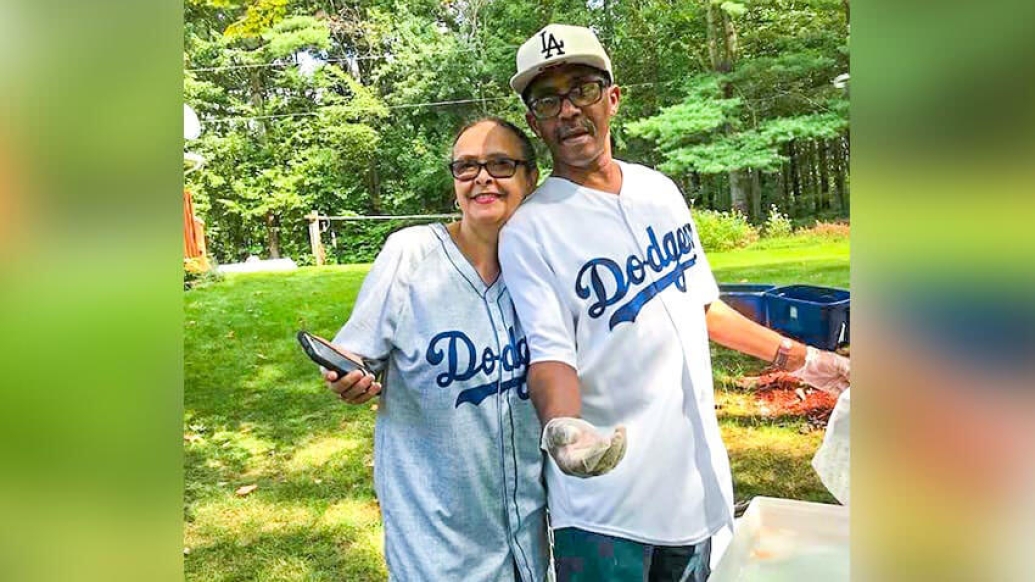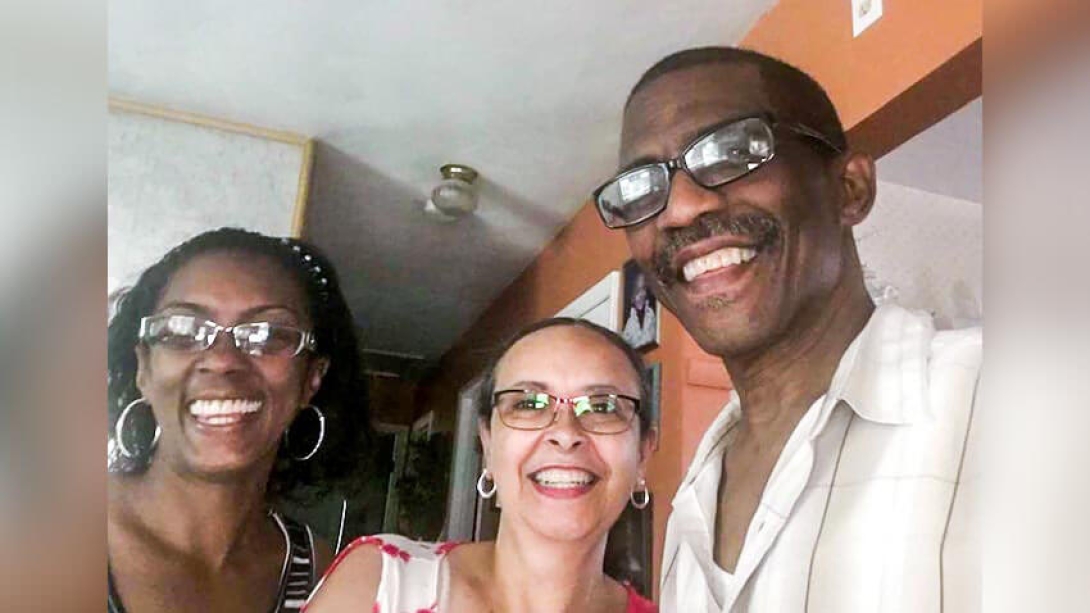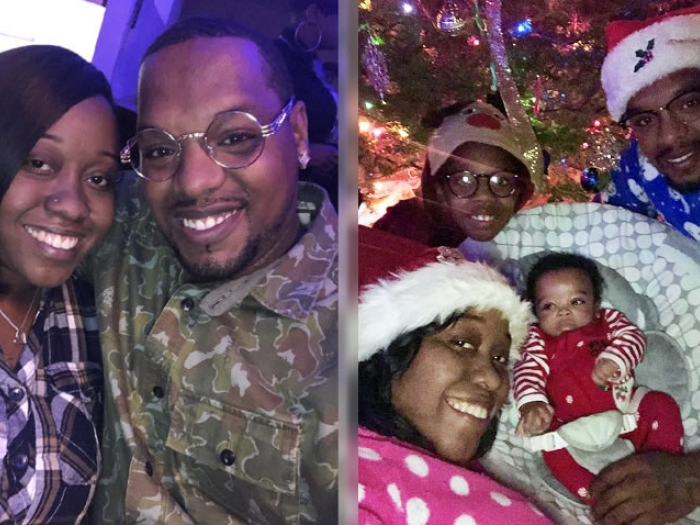A high-risk patient contracts COVID-19 and spends 40 days in the intensive care unit at Michigan Medicine. He recounts his experience and shares how his wife and a familiar doctor helped him survive.
5:00 AM
Author |

Dennis Duncan is a good man who loves his family. At 65, he's proud that he spent most of his adult life working for General Motors. He is a churchgoer, friendly neighbor and loving father.
And when Dennis smiles, you can see that it's beaming from his heart.
Before contracting COVID-19, the longest amount of time Dennis spent apart from his wife of 34 years was one week.
"Seven mere days is nothing compared to the 40 days my husband spent in the intensive care unit battling this disease," says Kathy Duncan about her husband's care at Michigan Medicine. "I had COVID-19 at the same time, but I was at home with mild symptoms while he was hospitalized. The experience was surreal. I'd call his room three to four times a day, and even when Dennis couldn't speak to me, the staff let me know that he was nodding along to the sound of my voice."
Dennis is also a fighter. In 2000, he first met Robert Fontana, M.D., University of Michigan's medical director of liver transplantation.
"I've known Dennis and Kathy for 20 years," says Fontana. "I treated him for Hepatitis C and liver failure and in 2016, he received a liver transplant at Michigan Medicine. I've probably seen Dennis with his wife by his side at least 40 to 50 times during the past two decades. I've gotten to know them both really well, and they are wonderful people. The kind of people that make you want to work harder as a physician."
I've probably seen Dennis with his wife by his side at least 40 to 50 times during the past two decades. I've gotten to know them both really well, and they are really wonderful people. The kind of people that make you want to work harder as a physician.
In mid-March 2020, Dennis suddenly became sick with a severe cough and fever.
"I went to the emergency room of a hospital near my home to get checked out," he says. "They told me that they were going to give me the COVID-19 test, and a day later, they called to tell me that my results came back positive. After that, everything started to go downhill."
Dennis' energy levels were tapped out, and he had difficulty doing basic things like getting ready in the morning.
"I would wash my face, and I'd be exhausted," he says. "I kept telling myself that something was very off, very strange. I was still processing the fact that I actually had the coronavirus. It was hitting me really fast."
So fast, that a few days later, he went back to the emergency room.
"I was having difficulty breathing, so I knew I needed help. I was at the hospital for one day before Dr. Fontana called to have me transferred to Michigan Medicine," says Dennis. "He spoke to my wife about my condition, and he knew that we needed to act fast."
According to Fontana, he had a "sixth sense" that something was very wrong. He also knew that transplant recipients are especially vulnerable to severe outcomes with COVID-19 because they are immunocompromised, meaning that their immune system's defenses are very low.
"Because of Dennis' liver transplant and diabetes, I knew that he was more susceptible to a severe infection versus one like his wife's. While many of our transplant recipients have done well with different diseases, there just wasn't enough data out there not to be worried – you have to remember that this was in the earliest days of the pandemic, March of this year," says Fontana. "Traditionally, transplant recipients don't handle the flu as well as other patients, so we were going on the data that we had that early on in the pandemic."
While Dennis was in the ICU, he was on a ventilator to help with his breathing, but his kidneys suddenly began to shut down. After dialysis, however, they appeared to bounce back.
"I don't even fully remember half of my time in that room, especially the dialysis," says Dennis. "But I do remember my wife calling me every day. The nurses would answer the phone and put the receiver up to my ear – that was the only way I could communicate with her, or anyone at home. The sound of her voice and my belief in God really kept me going."
After nearly 20 days in the ICU, Dennis began to improve. But not for long.
"When they moved me to another room, I was feeling great," he says. "But after a few days, my oxygen levels severely dropped and they had to put me on a high-flow nasal cannula, which gave me emergency oxygen. I nearly died."
As time progressed, Dennis eventually began to recover his breathing abilities and started to feel more like himself. He received a slew of medications, including broad spectrum antibiotics to treat his severe COVID-related pneumonia.
And after a grueling six-week stay, Dennis finally left the hospital, but severely debilitated and in need of oxygen treatments at home. His smile, however, still beamed from his heart as he was rolled out in a wheelchair, knowing very well that he dodged a bullet.

Dennis was eager to get better and recuperate at home with Kathy and the rest of his family nearby.
"I started physical therapy because I had been laying down for so long, and I had difficulty getting out of bed. The whole thing was so hard on my body," says Dennis. "Eventually, I was regaining my strength and they started weaning me off of the oxygen. I could finally breathe on my own again. I was even starting to eat solid foods like before."
"After nearly six weeks of care, Dennis left our hospital on May 7," says Fontana. "I regularly follow up with him, and I'm so impressed to see him up and moving and completely weaned off of the oxygen."
Fontana adds that Dennis' kidneys have also improved, and his health is as good, if not better, than before his bout with COVID-19.
And now, Dennis continues to live a life of gratitude.
"I'm so grateful for the role Dr. Fontana has played in my life. My liver is doing great, and I still see him every six months," he says. "The thing about Dr. Fontana is that he knows me. He knows what I've been through, and if there's ever anything going on with me, he wants to know about it. I appreciate that about him. Not only does he know his stuff, he also cares."
And as for Kathy? Well, Dennis knows that he wouldn't have made it without her.
"My wife is an incredible caretaker, even from afar. I was in that room by myself – day in and day out. I could only look out a window. It'd be easy for a person to lose hope when they're all alone like that. But I had my wife. And she has my heart."

Explore a variety of health care news & stories by visiting the Health Lab home page for more articles.

Department of Communication at Michigan Medicine
Want top health & research news weekly? Sign up for Health Lab’s newsletters today!





